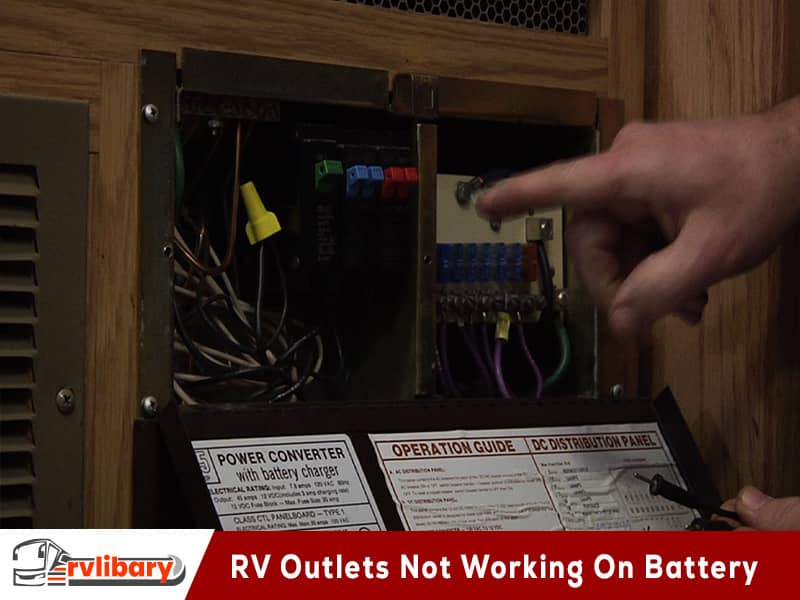Do you have your RV battery fully charged but the outlets inside are not working? We know how worrying it is when this happens. But no worries your RV is totally fine.
So, why are the RV outlets not working on battery?
The outlets provide 12-volts DC power while the appliances use 120-volts AC power. This makes the appliances and the outlets unusable. But you can solve this by using an inverter. The inverter will convert the 12-VDC into 110-VAC or 120VAC. Thus, making the outlets compatible with the appliances.
That was only the essence of the whole topic. We have done a complete discussion on the topic in this article.
Let’s waste no time and dive right in!
Battery System On RV
Before the detailed discussion, it’s better to understand the battery system on an RV.
Usually, an RV has two battery systems. One of them is the starter or chassis, situated at the front of the vehicle. The second one is in the living space. It is called the house or coach.
Batteries can sometimes cause some major accidents also. That’s why you must know about the battery hazards and prevention methods.
Now, let’s get acquainted with the RV batteries for better understanding-
Starter/Chassis Battery System
This system is basically used to start the cold engine. It can also power some basic lights. It doesn’t have any other purpose and runs on a 12-volt direct current. This battery system is not much of a concern to us.
House/Coach Battery System
The one responsible to power the whole RV appliances is this one. This battery system consists of one or more one deep cycle batteries.
The batteries are 12-volt system batteries. They are used to running mostly everything inside the RV. There are many outlets inside the RV which supply power from this battery system. This battery system can run heavy-duty systems like refrigerators, wall TVs. But there’s a catch!
The sockets are mostly 12-volt sockets. You will need 12-volt appliances to use these sockets directly.
So, what if your appliances can’t run on 12-volts? You might think the outlets are not working, or RV has low voltage problems. But is that the actual reason? No, it’s not, so let’s find out what causes this problem.
Why RV Outlets Won’t Work on Battery and its Solution?
The House or Coach battery provides 12-volts DC power to the outlets. You can use your 12-volts appliances by plugging in the outlets. Provided that you have enough stored charge in your battery system.
But most of our regularly used appliances do not use 12-volt power. They mostly use 110-volts or 120-volts alternating current. So, plugging and trying to run them won’t work. This can make it seem like the outlets are not working, which can be scary. But we can assure you, your RV is completely fine.
As the outlet’s power is not similar to the appliances’, the outlets don’t work. This is the main reason for RV outlets not working on the battery. Let’s take a look at the solution here-
Solution
The straightforward answer is you need 120-volt AC power to run your appliances. But how can that be achieved? Well, you need a power inverter to do that.
An inverter takes 12-volts DC power as input and provides 110-volts or 120-volts. It converts the DC input from the batteries and converts it into AC output. This equipment uses a very little bit of power to start.
There shouldn’t be any problem while powering heavy-load devices using an inverter. But, it’s better to connect lighter loads unless you have a great battery backup.
Because low battery backup can make heavy-load appliances like RV fridge shut off.
The converted power goes to the outlets of the RV. We can use our regular appliances by plugging them into those outlets.
Choosing the Right Inverter
Generally, appliances and devices need an extra power surge to start. The power consumption reaches its peak while starting them for the first time. After that sudden burst of power, the required power comes down to a lower amount.
To choose the right inverter for your RV, you need to follow this tip. You need to determine the wattage requirement of your 120-volts AC appliances. They can be refrigerators, TVs, laptops, ovens, water purifiers, and RV hand faucets, etc.
As mentioned earlier, they might require some extra power at first. So, you need to maintain some wattage allowance while choosing the inverter. For example, your total required wattage is 700 watts. The best option is to get a 1,000 – 1,500 watt inverter.
However, there is a drawback of larger capacity inverters. Inverters tend to drain power when they are switched on. More capacity means more power drain.
Also, try to avoid inverters that use modified sine waves. Because they might damage some 120-volts AC electric devices’ internal circuits.
They use pure sine wave compatible with most of the 120-Volts AC appliances. So, go ahead and pick one.
FAQs
Q: Should my RV must be plugged in for the outlets to work?
Answer: It is not a must but it’s better to plug it in different sources. This will help the RV to function to its full potential. A plugged-in RV offers much more than an unplugged one.
Q: How long does an RV run being unplugged?
Answer: The required power comes from batteries when the RV is unplugged. Under moderate usage of power, a 12-volts battery can last up to 2-3 days.
Q: Why are my RV batteries not charging?
Answer: The RV you use can stop charging for many reasons. It can be for corrosion of battery, converter issues. There can be problems with circuit boards as well. So, try to troubleshoot these things specifically.
Conclusion
That was everything for today. Hopefully, we could help you with the problem: rv outlets not working on battery.
Best of luck with trying out the solution!
Until next time. Stay happy and happy RVing!
